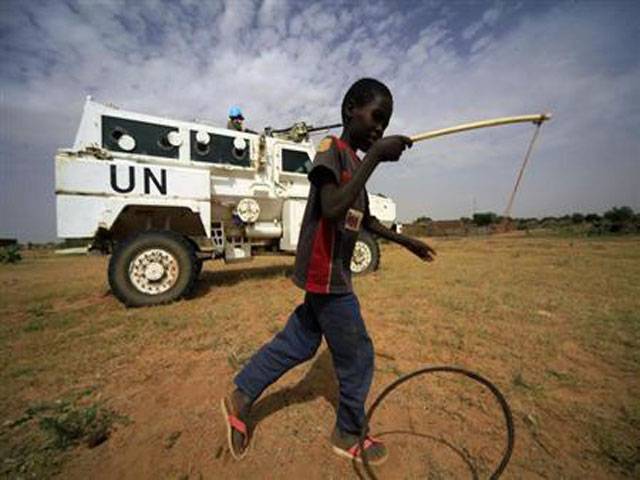KHARTOUM : Seven peacekeepers were killed on Saturday in Sudan’s Darfur region, the African Union-UN Mission said, marking the worst-ever losses in the five-year history of the operation.
UNAMID released few initial details of the incident, which adds to worsening violence in Sudan’s far-west region and happened near the peacekeepers’ base at Manawashi, north of the South Darfur state capital Nyala.
“Seven peacekeepers were killed and 17 were injured,” said UNAMID’s acting spokesman Christopher Cycmanick.
The incident occurred about 25 kilometres (16 miles) west of another UNAMID base at Khar Abeche, Cycmanick said. The patrol “was going from one team site to another,” he added. UNAMID did not immediately give the nationalities of the victims, but Tanzanian troops are in charge of that area.
Earlier this month three Tanzanian peacekeepers were wounded and an ambulance with their patrol was shot up in Labado, east of Nyala, Herve Ladsous, the UN’s Undersecretary General for Peacekeeping, announced during a visit to Sudan.
The peacekeepers killed at least one attacker, he said.
More than 40 UNAMID members have died in hostile action since the mission’s establishment in 2007.
But UN sources have said they were unaware of anybody previously being held accountable in Sudan for killing a peacekeeper, despite repeated UN calls for the perpetrators to be brought to justice.
In April, a Nigerian peacekeeper was killed and two others were wounded in an assault against their base east of Nyala.
At the time, local sources said the fatal attack appeared to have been planned and carried out by government-linked forces, but authorities denied such a connection.
A UN panel of experts earlier this year reported that former members of government militias “have forcibly expressed their discontent with the current government,” including through occasional cases of “direct attacks on UNAMID staff and premises”.
Rebels have been fighting for 10 years in Sudan’s far-western Darfur and have contributed to some of the unrest this year.
But UNAMID chief Mohamed Ibn Chambas has blamed inter-ethnic fighting for most of the violence, which has displaced an estimated 300,000 people.
UN experts, human rights activists and tribal leaders have accused government security forces of involvement in this year’s tribal fighting.
But Chambas said the nature of the disputes — mainly competition for land, water and mineral rights — made it hard to tell who was on which side as police and militia also had ethnic affiliations
Prior to Saturday, six other peacekeepers had been killed in attacks in Darfur since October.
A diverse group of critics from rebels to Darfur’s top official, Eltigani Seisi, have expressed concerns about UNAMID’s ability to safeguard the population, including 1.4 million displaced by Darfur’s decade-long conflict.
During his visit to Sudan this month Ladsous responded that UNAMID, with about 20,000 military and police officers, “has the inherent robustness to deal with the situation.”
But he admitted there have been a few cases where the peacekeepers’ actions did not meet expectations.
On October 2 four Nigerian peacekeepers were killed in an ambush near El-Geneina in West Darfur. At that time it was the deadliest attack in UNAMID history, UN sources said.
Rebels began their uprising against the Arab-dominated Khartoum regime in 2003.
Security problems have more recently been compounded by inter-tribal fighting, kidnappings, carjackings and other crimes, many suspected to be the work of government-linked militia and paramilitary groups.
Darfur’s top official, Eltigani Seisi, said in June that security agencies need a “show of force” against tribal militia violence.
Friday, April 19, 2024
Seven peacekeepers killed in Sudan’s Darfur

8:27 AM | April 19, 2024
8:09 AM | April 19, 2024
President Zardari confers Nishan-i-Imtiaz (M) award on Turkish CGS
8:23 PM | April 19, 2024
NA speaker suspends two MNAs for disruptive behavior during presidential address
8:20 PM | April 19, 2024
PM Shehbaz orders accelerating countrywide drive against smuggling
8:19 PM | April 19, 2024
LHC allows PTI to hold rally in NA-119
8:18 PM | April 19, 2024
Balochistan cabinet members to be assigned portfolios shortly, says CM Bugti
8:17 PM | April 19, 2024
A Tense Neighbourhood
April 19, 2024
Dubai Underwater
April 19, 2024
X Debate Continues
April 19, 2024
Hepatitis Challenge
April 18, 2024
IMF Predictions
April 18, 2024
Kite tragedy
April 19, 2024
Discipline dilemma
April 19, 2024
Urgent plea
April 19, 2024
Justice denied
April 18, 2024
AI dilemmas unveiled
April 18, 2024
ePaper - Nawaiwaqt
Advertisement
Nawaiwaqt Group | Copyright © 2024





